Review: The Worst Witch (Book) Series Review
by Christopher G. Nuttall
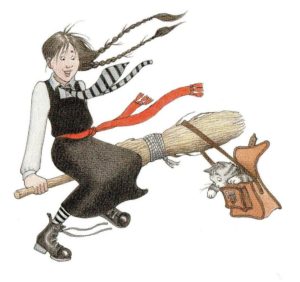 Mildred and Tabby atop her broom
Mildred and Tabby atop her broom
- The Worst Witch
- The Worst Witch Strikes Again
- A Bad Spell for the Worst Witch
- The Worst Witch All at Sea
- The Worst Witch Saves the Day
- The Worst Witch to the Rescue
- The Worst Witch and the Wishing Star
It is a truly unfair aspect of the modern-day magic school genre that Mildred Hubble is permanently overshadowed by Harry Potter, even though Mildred predates Harry by over twenty-three years. I read the first three books in my childhood and, after reading Harry Potter, I am left convinced that The Worst Witch was a major influence on JK Rowling. It is a series that deserve to be better known.
Like Harry Potter, The Worst Witch revolves around a British magic school – Cackles Academy. Unlike Harry Potter, The Worst Witch is solidly focused on a (nearly) all-female cast and, perhaps more importantly, is written mainly for children. The series follows Mildred Hubble – the titular ‘worst witch’ – as she makes her way through the school, although – again, unlike Harry Potter – the books aren’t strictly bound to specific school years.
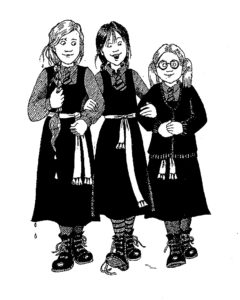 Mildred herself is, in many ways, far more endearing than Harry Potter. She’s clumsy and often very unsure of herself, which gets her into trouble with the dreaded Mrs Hardbroom. On the other hand, she’s brave, loyal and – when the chips are down – proves she’s definitely a heroine. She’s also lucky, it should be noted; when she decides to run away, towards the end of The Worst Witch, she just happens to encounter a group of evil witches planning to attack the academy and turns them all into snails. (Later on, she manages to save a wizard’s life and humanity after being turned into a frog herself.) There’s a lot about Mildred and her friends, Maud Moonshine and Enid Nightshade, for both girls and boys to like.
Mildred herself is, in many ways, far more endearing than Harry Potter. She’s clumsy and often very unsure of herself, which gets her into trouble with the dreaded Mrs Hardbroom. On the other hand, she’s brave, loyal and – when the chips are down – proves she’s definitely a heroine. She’s also lucky, it should be noted; when she decides to run away, towards the end of The Worst Witch, she just happens to encounter a group of evil witches planning to attack the academy and turns them all into snails. (Later on, she manages to save a wizard’s life and humanity after being turned into a frog herself.) There’s a lot about Mildred and her friends, Maud Moonshine and Enid Nightshade, for both girls and boys to like.
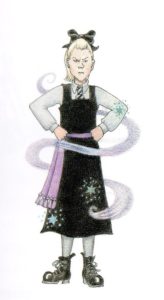 Mildred is pitted against Ethel Hallow, who is very much a female (and considerably more intelligent) version of Draco Malfoy, complete with a rich father who has considerable influence over the school. Like Draco, she fills the role of the school bully; unlike Draco, she is never overshadowed by far more powerful and dangerous foes. (How’s Draco going to compete with the Dark Lord?) Ethel is often the catalyst for events that shape Mildred’s life, normally by accident. She’s also a budding sociopath in the making.
Mildred is pitted against Ethel Hallow, who is very much a female (and considerably more intelligent) version of Draco Malfoy, complete with a rich father who has considerable influence over the school. Like Draco, she fills the role of the school bully; unlike Draco, she is never overshadowed by far more powerful and dangerous foes. (How’s Draco going to compete with the Dark Lord?) Ethel is often the catalyst for events that shape Mildred’s life, normally by accident. She’s also a budding sociopath in the making.
The two most important teachers in the series – Mrs Cackle and Mrs Hardbroom – may well have served as the inspiration for Professors Dumbledore and Snape. Mrs Cackle is a good-natured headmistress – it should be noted that she is nowhere near as dangerously incompetent as Dumbledore – while Mrs Hardbroom fills the role of the strict potions teacher, feared by all of her students. Mrs Hardbroom favours Ethel to some degree, although she is nowhere near as willing to indulge the little brat as Snape tolerates Draco. It’s fairly clear that Mrs Hardbroom prefers students who concentrate on their studies than run amuck. There are also hints that she isn’t as strict as she acts.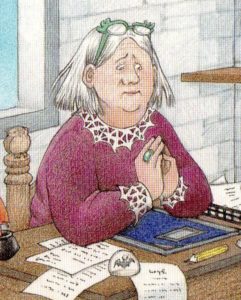
(There are a handful of other teachers, but none of them make more than brief appearances.)
Mildred’s adventures grow more complex as the series goes on, although they are never as complicated as Harry’s. They’re also more focused on common childhood problems (Mildred’s age is never specified, if I recall correctly, but I’d say she was twelve). She is more focused on passing tests, dealing with bullying and surviving the school than defeating a dark lord. In the first book, for example, she runs away out of fear of being expelled; in the sixth book, she finds herself taking part in a competition to win a new swimming pool for the school. That said, she also finds herself helping others – and facing Agatha Cackle, the headmistress’s evil twin, twice.
The series neatly avoids both shipping wars and gender politics, at least partly because Cackles is single-sex. There are wizards, but none of them are more than guest roles. On a minor level, there is no discussion of specifically (and stereotypically) female issues; no boys, no dating, no periods, etc. This makes it easier for boys to like Mildred and her friends, instead of feeling that they cannot empathise with her. And, on a major scale, there’s no suggestion that women are better than men or vice versa.
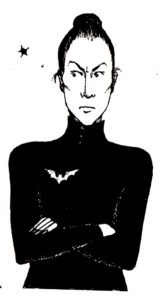 Indeed, for all that it is written for children, the series does focus on virtues that appeal to both genders. Mildred risks everything to help people who need help, from crashing the Great Wizard’s party to get him, to save a friend to putting her life on the line, to remaining loyal to a beloved pet or saving the school from its enemies. Mrs Cackle is a reasonable authority figure and even Mrs Hardbroom has her moments. Even Ethel, for all of her vindictiveness, has moments of doing the right thing (and sometimes the wrong thing for the right reasons, such as turning Mildred into a frog in revenge for Mildred scaring Ethel’s sister.) It’s easy to see why the books retain a certain charm that, I think, Harry Potter came to lose over the years.
Indeed, for all that it is written for children, the series does focus on virtues that appeal to both genders. Mildred risks everything to help people who need help, from crashing the Great Wizard’s party to get him, to save a friend to putting her life on the line, to remaining loyal to a beloved pet or saving the school from its enemies. Mrs Cackle is a reasonable authority figure and even Mrs Hardbroom has her moments. Even Ethel, for all of her vindictiveness, has moments of doing the right thing (and sometimes the wrong thing for the right reasons, such as turning Mildred into a frog in revenge for Mildred scaring Ethel’s sister.) It’s easy to see why the books retain a certain charm that, I think, Harry Potter came to lose over the years.
As an adult, it is easy to regret the limited world-building and the handful of plot holes. How did ‘Mrs Granite’ manage to sneak into the school when her ‘disguise’ consisted of an all-enveloping fur coat? It isn’t clear how Cackles and the magical community relates to the outside world (or even if there is an outside world). It’s also hard to accept Mildred – a first-year witch – casually defeating a coven of evil witches, although she did catch them by surprise. We also learn next to nothing about Mildred’s family, for better or worse. (The more we learnt about Harry’s family, the less likeable they became.) On the other hand, the books are still likable to an adult, regardless of the plot holes. There are far too many other children’s books that are left behind as the reader grows older.
The Worst Witch spawned a tele-movie and three television series. I haven’t watched the movie, but I wasn’t impressed by the handful of series episodes I watched (even though the producers elaborated on the universe and came up with new stories.) The books, however, are still worth a read.
The Worst Witch series on Amazon (for individual titles, see above.)

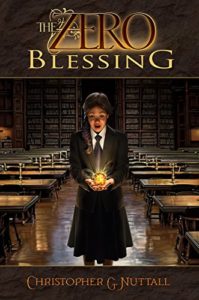
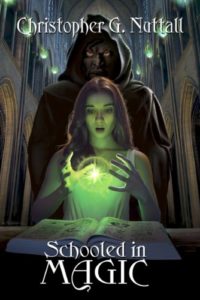
B>Mrs Hardbroom favours Ethel to some degree, although she is nowhere near as willing to indulge the little brat as Snape tolerates Draco.
Ahh… You may be forgetting that Snape was a double agent. Both his harassment of Harry and the Gryffindors, and his favouritism towards Draco and the Slytherins were part of the Great Game.
That said, a do remember reading these books with great pleasure when I was a girl. I don’t know if the yard ape is too old for them now but I’ll check.
A side note: should it not be “the sexes” rather than “the genders”? These are human beings after all, not things.